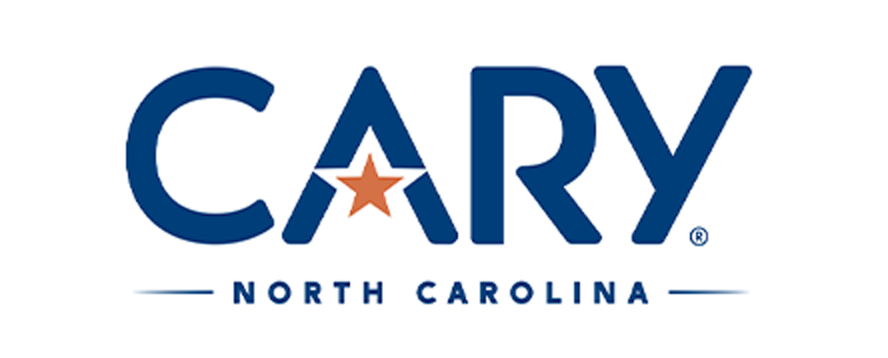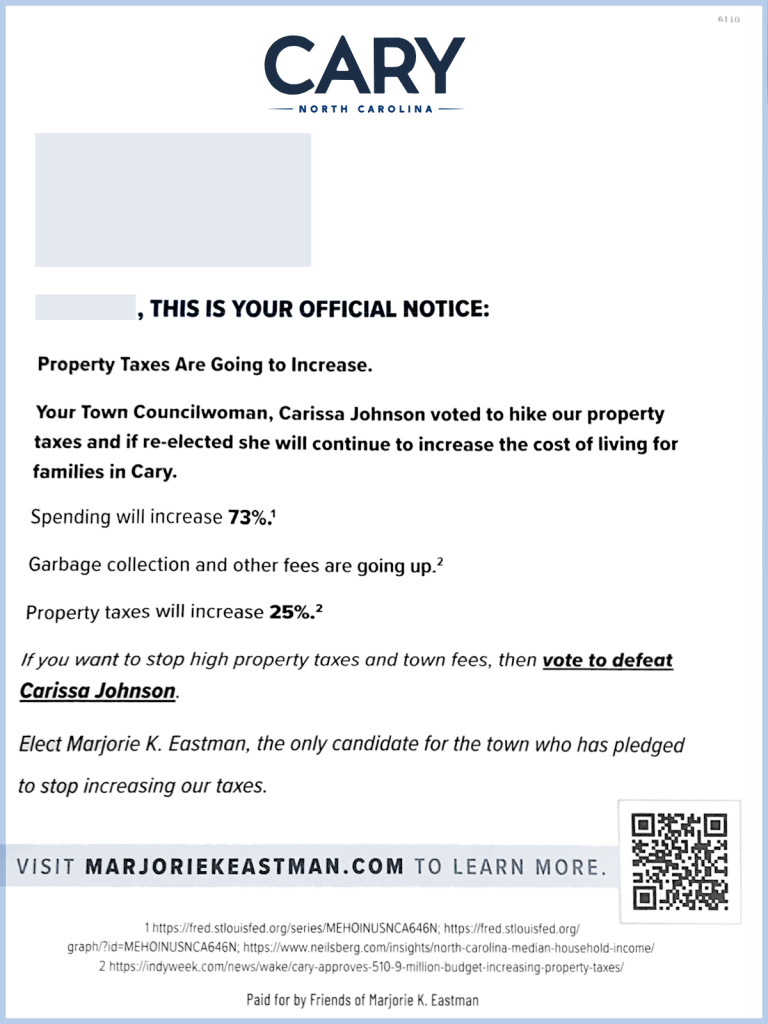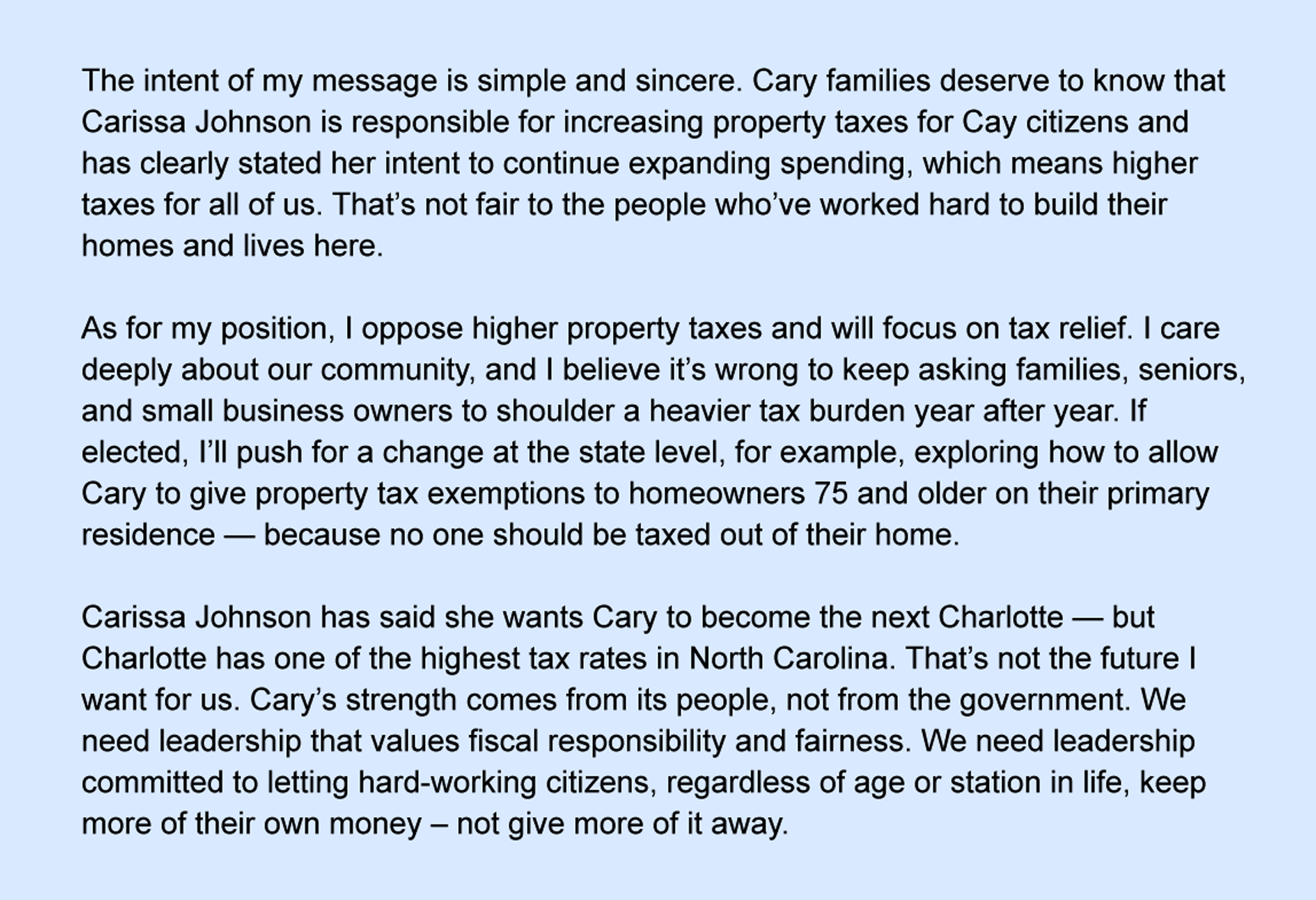Cary town council candidate Marjorie Eastman is sending out misleading campaign mailers that criticize her opponent, at-large incumbent council member Carissa Kohn-Johnson, on letterhead that imitates official Town of Cary branding.
The mailers come in an envelope emblazoned with a logo similar to the Town of Cary’s trademarked logo and the words “URGENT: PROPERTY TAX INCREASE NOTICE, IMMEDIATE ACTION REQUIRED.”

The letter inside begins with the warning “THIS IS YOUR OFFICIAL NOTICE: Property Taxes are Going to Increase” before noting that it was paid for by the Friends of Marjorie K. Eastman campaign committee.

Town of Cary chief strategy officer Susan Moran told INDY that a few residents have contacted the town to complain about the mailers.
“While the campaign materials do look a lot like Cary’s trademarked logo, and, therefore, likely—and unfortunately—give recipients an initial false impression that the mailer is official Town business, there are enough differences for this parody or knockoff to be acceptable under First Amendment protections,” Moran wrote in an email. “At this point, our response is limited to simply addressing comments and inquiries we’re getting from what is, so far, a handful of annoyed citizens.”
A spokesperson for the NC State Board of Elections confirmed to INDY that the mailer does not violate any state policy, since it includes a disclosure that it’s a campaign communication.
The mailers contain a handful of inaccurate statements about the Town of Cary’s budget and taxes. INDY asked Eastman to provide more evidence or more context, but in a written statement, which she requested the INDY include in full, Eastman did not offer any new information in support of her claims and made additional claims about Kohn-Johnson that the INDY was unable to verify.
We fact-checked the statements in Eastman’s mailer below:

This is true. Cary’s property taxes are increasing from 32.5¢ to 34¢ per $100 valuation in fiscal year 2026.

Carissa Kohn-Johnson did vote to increase taxes—as did every other council member—and has said that she couldn’t see a way to maintain the current level of town services and complete key infrastructure projects without raising taxes.
“I like to look [my constituents] in the eyes and tell them the truth: ‘I don’t see a path to avoid raising your taxes,’ because I won’t pander and I will not lie to get a vote,” Kohn-Johnson told INDY in September. “I do not see a path forward without some modest tax increases, because we have critical infrastructure work we absolutely have to do.”

There is no evidence to support this statement. The links in footnote 1 show trends in North Carolina median household income, which are unrelated to the town government spending Eastman is discussing here.
Cary’s FY26 budget anticipates the town will spend about $510.9 million this fiscal year. In FY25, the town spent an estimated $380.8 million. That’s about a 34 percent increase.

This is true. Cary’s solid waste and recycling fee increased from $23 to $26 per month per household this budget cycle, which is consistent with two decades’ worth of incremental fee increases. See the Town of Cary FY26 budget, page 106 for more historical data.

There is no evidence to support this statement. Footnote 2 links to INDY’s own reporting that the Cary Town Council unanimously voted to increase property taxes from 32.5¢ to 34¢ per $100 valuation for fiscal year 2026. That is a 4.6 percent tax rate increase.

The town council voted unanimously to raise property taxes by 1.5¢ per $100 valuation this year, citing inflation, important infrastructure projects, and a desire to maintain the current level of town services. Cary joined Durham and Apex in raising taxes this year. Eastman did not respond to INDY’s question about how, specifically, she would propose to keep the tax rate stable.
We asked Eastman where she got her data and how she would propose to keep taxes stable if elected. In her response she did not directly address those questions. Instead, she doubled down on her criticisms of Kohn-Johnson and suggested that property tax exemptions for older homeowners would be one way to lower the tax burden on Cary residents. She also noted that her campaign strategist Paul Shumaker, who also represents U.S. Sen. Thom Tillis, helped her design the mailer.

Even if Eastman was able to lobby the state legislature to enact those tax exemptions, it’s unclear how that would solve Cary’s budget crunch, since the town would presumably need to charge younger residents more to offset the exemptions, or else collect less tax revenue overall.
Kohn-Johnson did not immediately respond to a request for comment on the mailer and Eastman’s statement.
Campaign finance records show that Eastman is renting the P.O. Box listed on her mailers from Kimberly Stonebraker, a former campaign manager for the far-right superintendent of public instruction candidate and Cary resident Michele Morrow. Stonebraker was also the first treasurer for Eastman’s campaign committee, though Eastman now has a different treasurer.
During Morrow’s 2024 run, the The North Carolina Association of Educators sent her a cease-and-desist letter after she distributed red, apple-shaped campaign literature that resembled the NCAE’s trademark palm cards, but instead read “Make Education Great Again.”
Stonebreaker did not respond to INDY’s request for comment about the nature of her involvement in Eastman’s campaign.
Chloe Courtney Bohl is a Report for America corps member. Follow her on Bluesky or reach her at [email protected]. Comment on this story at [email protected].
